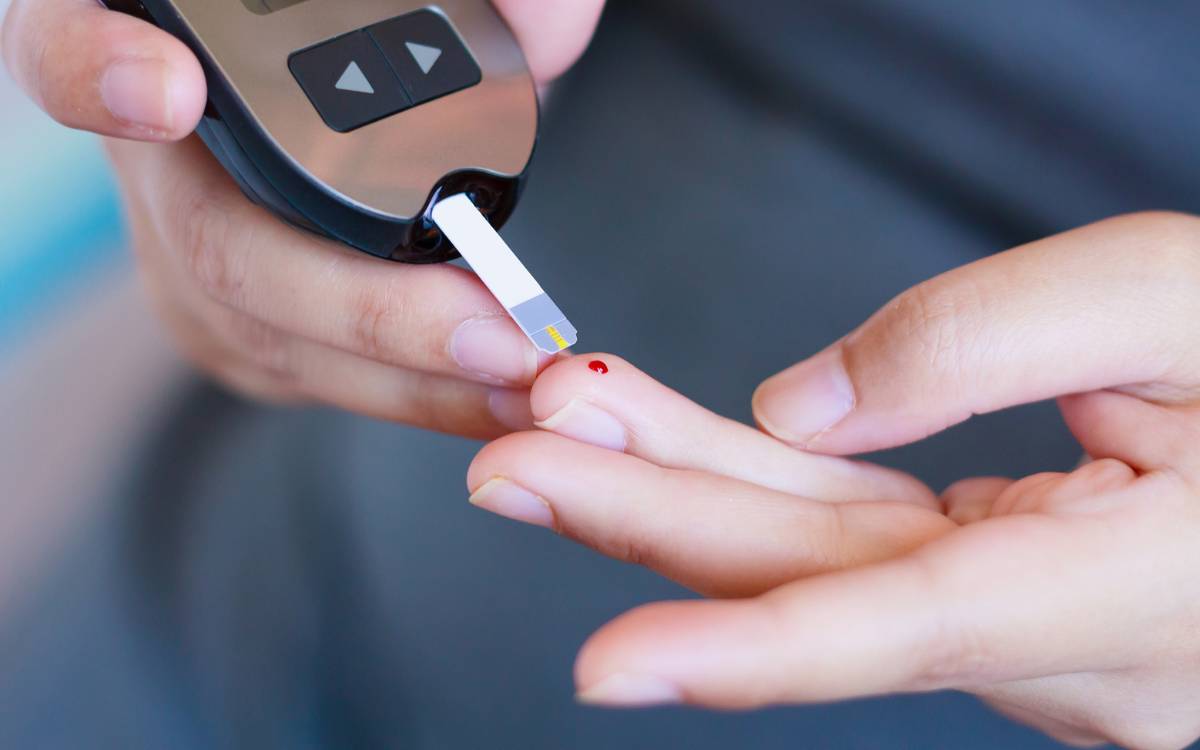Yes, diabetes can cause weight loss in men. Diabetes is a chronic condition that affects how your body utilizes insulin and glucose levels.
When not managed properly, it can lead to high blood sugar levels which, if left untreated, can result in weight loss in men.
This occurs because the body does not produce enough insulin or utilize the insulin produced appropriately. This then causes the body to burn excess fat and muscle for energy, resulting in weight loss.
In addition to weight loss, diabetes can also cause other symptoms such as fatigue, blurred vision, frequent urination and thirst, slow-healing wounds, and infections.
If you notice any of these signs or experience sudden weight loss, it’s important to visit your doctor right away for a diagnosis and treatment.
With proper medical management, diabetes can be managed effectively and help prevent weight loss associated with the condition.
It is important to note that weight loss due to diabetes should not be confused with healthy weight loss achieved through diet and exercise.
If you are looking to lose weight in a safe and effective way, it’s best to seek the advice of a doctor or nutritionist. This will help ensure that any weight loss program is tailored to your individual needs, taking into account your medical history and current health status.
By following a healthy diet and regular exercise routine, men with diabetes can lead happy and healthy lives.
With the right medical management and lifestyle changes, you can gain better control of your blood sugar levels and prevent or delay the onset of diabetes-related weight loss.
If you’re concerned about weight loss due to diabetes, it’s important to speak with a doctor right away.
With the right treatment plan, you can help keep your blood glucose levels under control and manage any potential weight loss.
This may include lifestyle changes such as healthy eating habits and regular physical activity, as well as medications to help manage your diabetes. With the right care and support from your doctor, you can successfully keep diabetes-related weight loss at bay.
How Diabetes Affects Men Differently Than Women?
Men are more likely to develop diabetes than women, and the condition often progresses faster in men than in women. This is due to several factors including hormones, lifestyle choices, and genetics.
In addition, men may experience different symptoms of diabetes than women.
- Men tend to have higher blood glucose levels, which can lead to increased thirst, frequent urination, and fatigue.
- Men may also experience erectile dysfunction, which is often caused by poor blood flow to the penis.
- Men are more likely to develop microvascular complications of diabetes such as retinopathy and neuropathy than women. This is because men have higher levels of testosterone, which can increase their risk for cardiovascular complications.
- Men are also more likely to develop cardiovascular disease and stroke as a result of diabetes than women. This is because men tend to have higher levels of cholesterol and triglycerides, which can make them more susceptible to heart attack and stroke.
- Finally, men are more likely to be overweight or obese than women, which increases their risk for developing type 2 diabetes.
Being overweight or obese can cause the body to be resistant to insulin, leading to increased blood sugar levels.
Overall, men are more likely than women to develop diabetes and its associated complications due to a combination of genetic, hormonal, and lifestyle factors.
It is important that men follow a healthy diet and exercise routine to reduce their risk for diabetes and its complications.
They should also be sure to monitor their blood sugar levels regularly to ensure they remain within an acceptable range.
|
The #1 Rated Blood Sugar Formula
|
Signs of Unintentional Weight Loss in Men With Diabetes
Diabetes-related weight loss in men is often unintentional and can be caused by a variety of factors. It’s important to know the signs of diabetes-related weight loss so that you can take appropriate action if it occurs. Here are some common signs of unintentional weight loss in men with diabetes:
1. Unexpected changes in appetite – Unexplained and sudden fluctuations in appetite are one of the most common signs of unintentional weight loss. Men with diabetes may suddenly experience a decrease in hunger or an increase in food cravings, or they may have difficulty eating even when they feel hungry.
2. Unusual fatigue and exhaustion – Diabetes-related weight loss often causes men to experience an unusual level of fatigue, even after getting plenty of rest. This can make it difficult for them to perform everyday tasks or engage in physical activities that they once enjoyed.
3. Unexplained muscle weakness – Unintentional weight loss can also lead to muscle weakness due to the lack of nutrients and energy. Men with diabetes may experience a decrease in muscle strength, making it difficult for them to perform everyday tasks.
4. Unusual body mass index – Body mass index (BMI) is an important measure of body fat based on a person’s height and weight. Men with diabetes who are experiencing unintentional weight loss may have a lower-than-normal BMI.
5. Unusual fluctuations in blood sugar levels – Unexplained changes in blood sugar levels can be another sign of diabetes-related weight loss. Men with diabetes may experience higher than normal readings after eating, or they may experience low glucose levels between meals or overnight.
If you experience any of these signs, it’s important to talk to your doctor and develop a plan for managing your diabetes-related weight loss. With proper treatment, you can help prevent further complications and regain some of the lost weight.
Causes of Weight Loss in Diabetic Men
Weight loss in diabetic men can be caused by a variety of factors. Poor diet, insufficient physical activity, and certain medications are some of the most common causes.
- Poor nutrition is one of the primary causes of weight loss in diabetic men. Eating foods that are high in carbohydrates and saturated fats will lead to weight gain and can worsen diabetes symptoms. Eating foods that are high in fiber and protein, such as vegetables, beans, and lean meats can help maintain a healthy weight.
- Insufficient physical activity is another cause of weight loss in diabetic men. Exercise is important for maintaining blood sugar levels in patients with diabetes. Aerobic activities such as walking, jogging, cycling, and swimming can help to reduce insulin resistance and improve weight management.
- Certain medications can also lead to weight loss in diabetic men. Beta-blockers, antidepressants, and some steroids may cause men to lose weight as a side effect. It’s important for people with diabetes to be aware of the potential side effects of their medication so they can take steps to counteract them.
- Finally, stress can contribute to weight loss in diabetic men. Stress hormones can affect appetite and cause cravings for unhealthy foods which can lead to weight gain or make it more difficult to lose weight.
It’s important for people with diabetes to learn how to manage their stress levels in order to maintain a healthy weight.
Tips for Managing Weight Loss Related to Diabetes
1. Choose healthy meals and snacks: Eating a balanced diet that includes whole grains, fruits, vegetables, lean proteins, and healthy fats can help you maintain a healthy weight and manage your diabetes.
2. Monitor your portion sizes: Keeping an eye on the amount of food you eat is important for diabetes management and weight loss. Use smaller plates and measure out your portions to keep track of how much you’re eating.
3. Get active: Exercise can help improve your blood sugar levels and control your weight. Aim for at least 30 minutes of physical activity per day, such as a brisk walk or swim.
4. Stay hydrated: Drinking plenty of water throughout the day can help keep you feeling full so you don’t overeat. Water can also help your body process insulin more efficiently.
5. Get enough sleep: Sleep deprivation can lead to weight gain, so make sure you are getting at least 7-9 hours of quality sleep each night.
6. Limit added sugars and processed foods: Eating too many added sugars and processed foods can lead to weight gain. Limit these types of foods, choose healthier alternatives instead.
7. Keep a food diary: Writing down everything you eat throughout the day can help you stay on track with your healthy eating plan. It can also help you identify areas where you can make changes or improvements.
8. Avoid diet fads and crash diets: These types of diets can be harmful to your health and are not recommended for diabetes management.
9. Talk to a doctor or nutritionist: A healthcare provider can help you develop an individualized plan that meets your needs and helps you reach your weight loss goals.
10. Stay motivated: Weight loss can be a long process, and it may not happen as quickly as you’d like. Remember to celebrate small successes along the way, and don’t give up!
Final Thoughts on Managing Weight While Living with Diabetes
Living with diabetes is a challenge, but it doesn’t mean that you can’t manage your weight.
Following the tips outlined in this article will help you make healthier choices and create an effective plan for managing your blood sugar levels while also achieving healthy weight loss goals.
Don’t forget to talk to your doctor or nutritionist if you need additional guidance on how best to approach managing your weight while living with diabetes.
With dedication and consistency, you can keep yourself motivated as work towards better health and wellness!

